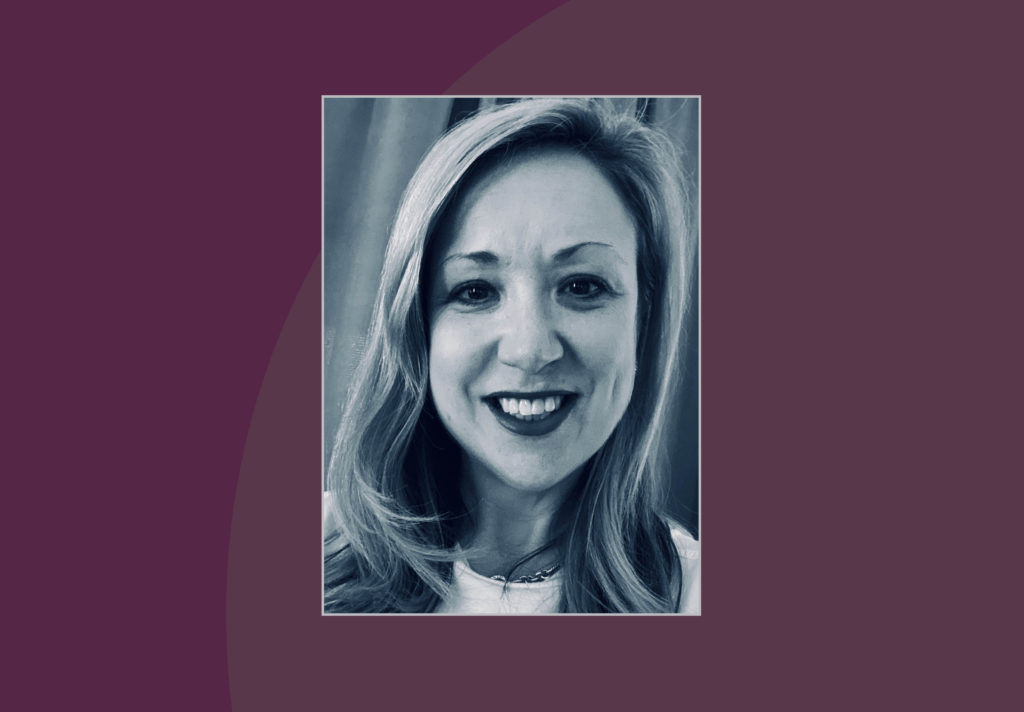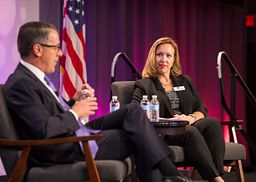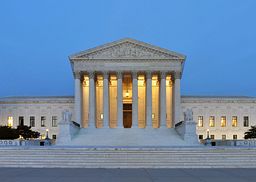Get to Know PAEA’s Interim Chief Executive Officer, Sara Fletcher

Interim Chief Executive Officer Sara Fletcher, PhD, is no newcomer to the education space or to PAEA. She began her eight-year tenure with PAEA as the Association’s Chief Academic Officer where she oversaw faculty development, curriculum, and assessment offerings. In this position, Sara led PAEA’s digital transformation, creating a more seamless online experience, increasing member engagement, and better connecting members with PAEA’s professional development offerings. She has served as PAEA’s interim CEO once before, where she demonstrated an acute understanding of the forces shaping higher education and opportunities for PAEA to lead the future of PA education, before being promoted to Chief Operating Officer in 2021.
Before joining the Association in 2014, Sara’s career was spent in education, serving as a public school teacher, school administrator, and director of medical education at Wake Forest School of Medicine before earning her doctorate in educational leadership.
PAEA President Kara Caruthers, MSPAS, PA-C, recently spoke with Sara about how her dual perspectives in education and leadership have informed her vision for the Association and its role in the rapidly evolving medical education landscape. Below are highlights from their conversation.
Kara: Sara, in your role as chief operating officer, you had the opportunity to lead the development of PAEA’s new strategic plan. Why was it time for us to update the strategic plan?
Sara: This year is the Association’s 50th Anniversary. While it is certainly important to celebrate our history, it is also important to plan how we will sustain 50 more years.
Our environment has changed—not just because of the pandemic, but also because expectations are changing, demands for more immediate solutions to real world problems are increasing, and seeing a quicker and more impactful return on investment are essential. Meeting our members’ needs is essential to PAEA’s relevance, longevity, and success.
We had to really ask ourselves, “Who does PAEA want to be for our members?” I think this new strategic plan reflects the maturation of the Association. We were intentionally aspirational in defining our goals, thinking about what PAEA can influence. There are many changes and big conversations happening within the profession ranging from optimal team practice (OTP) and title change to increasing diversity and equity in the profession. PAEA needed a clear understanding of our mission, vision, and values to ensure we adequately respond to–and lead– environmental shifts.
Kara: I agree, audacious goals are needed and important. I also think that we wanted this new strategic plan to be more than something that sat on a shelf; we wanted it to be something that could continue to evolve and continue to spur us into action.
Sara: To your point, Kara, I have always felt that culturally, PAs value action, pragmatism, and hard work. Setting truly aspirational goals makes sense because PAs will naturally push themselves to keep changing and progressing. This plan is a roadmap that tells us where we need to focus and where we need to invest our resources to make the greatest impact for our members and for the profession.
Kara: Absolutely. You have served as PAEA’s interim CEO both pre- and post-pandemic. How has the pandemic changed the Association?
Sara: In many ways, PAEA had a leg up on many other organizations. Over half of our staff was already working remotely. We also had plans in place to begin introducing virtual or hybrid events, and COVID just accelerated those plans.
The pandemic had the biggest effect on our education programming, including our workshops and Education Forum. We knew how important it was for our members to stay connected. I couldn’t be prouder of the whole staff for leaning into virtual modes to keep engagement high and finding ways to make our gatherings interactive and fun.
Providing a seamless member experience is extremely important to everyone at PAEA. The pandemic has challenged us to keep engaging with members and then act upon what we’re hearing. I firmly believe that our Association’s key to relevance will be ensuring that our members remain at the forefront of everything we do and have yet to do.
Kara: Attending the virtual Education Forum was such a cool experience. I can only imagine what it was like to plan that event during the first year of the pandemic, particularly since the Education Forum was under your oversight. Since we’re peeking behind the curtain anyway, can you tell us a more about the Forum’s transition to a virtual model?
Sara: I’ll admit that thinking about that time still gives me heart palpitations! It was one of the most professionally challenging yet rewarding experiences. We never imagined we would hold one— much less two—virtual Education Forums.
First, let me give credit to Sonja Vientos and her entire team who planned the Forum.
We knew planning a virtual event was not just a matter of taking what we did in person and replicating it online; it didn’t translate. Our starting point was to consider, at the core of the Forum, what matters most to members. From years of surveys and firsthand experiences, we knew the answer was networking and education sessions, so we kept both of those at the forefront of the planning. We also asked members what they were struggling with and what they needed from education sessions. Making decisions with our members in mind was key to the success of the virtual Forum because it kept us grounded and focused on delivering what they wanted.
I’ll add that one of the other biggest keys to our success, which has been kind of a guiding principle for us for years now, is doing things unconventionally. For example, embracing tools, like Bizzabo or Salesforce, that may differ from what similar associations use. We always try to prepare for what’s coming tomorrow rather than just thinking about today. We’re trying to set ourselves up for the Association’s next 50 years.
Kara: I served on the Board of Directors in 2018 when you presented your team’s vision for the Digital Learning Hub. It is impressive that you were able to push the Association to grow in the digital space before the pandemic, which then brought an uptick of people using the Digital Learning Hub and Professional Learning Communities. I think that that speaks to your leadership and insight on the educational landscape and how those skills have benefited PAEA in the past and present. What else is on the horizon for PA education? Where should PAEA focus next?
Sara: Well, first, thank you, Kara, for the compliments. I have given a lot of thought to what is next because, as you’ve said, these last two years—wow, we didn’t see that coming.
Both right now and moving forward, I see PAEA playing a key role in bringing visibility to PA educators and the innovations that are happening in our member programs. I think the broader medical education and health professions education community have a lot to learn from this profession. For example, we already see some medical schools reducing the length of time in undergraduate medical education. PAs have always been efficient, leveraging every minute in their education, which serves our nation and the profession very well. I think PAEA will play a role in amplifying and publicizing what is so great about the PA education model.
We can also share what is working well within our community so that our newer programs, and even some of our established programs, can learn from and partner with one another. PAEA serves as our profession’s national ‘eyes and ears’ and plays a major role in connecting and convening people for problem solving and for sharing ideas. I think that one of PAEA’s primary roles is to provide an opportunity for PAs to get to know one another, to practice their leadership, and to exercise their educational muscles, be that in a workshop or through networking. We serve as a learning lab for PA educators.
Kara: Sara, from your perspective, what will PAEA look like in our next 50 years?
Sara: I see us extending our reach through regional connections and events. Before the pandemic, we were exploring the idea for regional education meetings because we know that the human and financial costs of travel can be prohibitive. The PAEA workforce is distributed across the country, which will become increasingly helpful in facilitating local gatherings.
PAEA can play a major role in facilitating connections and helping institutional leadership see the return on investment in regular networking and idea-sharing, whether in person or using our digital tools. One of our guiding principles for developing the Pathways to Professional Excellence Plan, which included the vision for the Digital Learning Hub and Professional Learning Communities, was ensuring that PA educators have 24/7 access to the resources they need to be successful.
Additionally, we know how important our Assessment products are to programs. We will continue to invest in the outstanding work of our Assessment staff and volunteers to ensure they remain reliable and valid.
Kara: Thank you for sharing your perspective, Sara. And most importantly I would say, as president of the board this year, it has been an honor for me to work with you in your role as interim CEO. Thank you for your care for medical education and for the Association. During your eight years with PAEA, you have constantly pushed us to do better and get things done.



